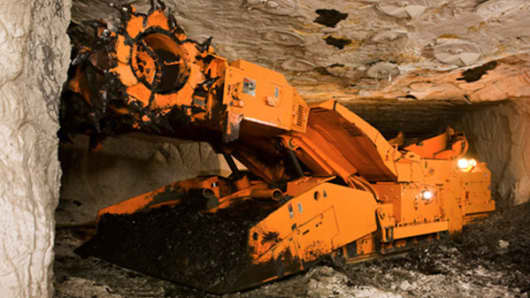The commodities "supercycle" is dead. If anyone was still in doubt about whether the era of ever-rising prices driven by rapid Chinese growth was over, events of the past week have surely dispelled it.
The dollar rally after the Federal Reserve's hints about tapering its "quantitative easing" program, together with fears about a liquidity crunch in China, have sent a ripple of fear through the commodities industry.
So what should investors do about it? The answer may be less obvious than it seems. Most commodity prices have already fallen dramatically. Since their respective peaks in 2011, copper prices are down 35 percent, iron ore prices have fallen 40 percent, and gold has tumbled 36 percent.
"People have generally been positioned for the slowdown in materials demand," says Kamal Naqvi, head of commodity sales at Credit Suisse. "But we're getting towards the end of that particular trade. For metals to be a conviction short from here, clients are waiting on confirmation that demand is worse and/or that supply is better than people have been factoring in."
The shares of commodity producers have been under even more severe pressure. Anglo American shares are down 64 percent from their 2011 peak; Vale is 45 percent lower; and Kazakhmys has lost 85 percent.
As Jake Greenberg, metals and mining specialist at Jefferies, observes: "If you're investing now based on the end of the supercycle theme, you might be a little bit late to the party shorting mining shares."
(Read More: Warning: 'Prepare' for Commodity Supercycle End)
What is a commodity bear to do? Some traders and hedge fund managers are now looking for more arcane opportunities to profit from the end of the commodities supercycle.
Scott Hobart, portfolio manager at HFZ Capital Management, a Hong Kong-based hedge fund that focuses on the commodities sector, argues that some industries and economies that have profited from the commodities boom have so far escaped the precipitous falls seen in metals prices and miners' shares.
And yet, the end of the supercycle is likely to affect some industries even more acutely than mining. As miners' profits fall, their investments in new mines are likely to fall even faster – indeed, much of the rhetoric from mining industry executives over the past year has focused on paring back capital expenditure.
Australia's Bureau for Energy and Research Economics recently estimated that resource projects worth 150 billion Australian dollars ($139 billion) had been cancelled or delayed in the country in the past year. Citigroup is forecasting that global capital expenditure across the mining industry will be 30 percent lower by 2015 than it was last year.
That bodes poorly for companies whose business is to service the mining industry: from the makers of shovels or drill bits to the suppliers of temporary housing in the Australian outback.
(Read More: Commodity Super Cycle Is Dead: Citi)
"The miners were the first to feel the pain of the reversal in the cycle, but to us that's just the first round impact," says Mr Hobart. "The ramifications for other sectors and economies are pretty stark."
Indeed, the mining services sector has just had its first significant casualty: Sydney-listed Allmine Group, which provides parts and specialist workers to the mining industry, fell into administration last Friday. Its shares had fallen 75 percent since the start of the year.
But Mr Hobart believes that other mining services companies are still overvalued. The drop in spending by the mining companies hurts them in two ways – by reducing their order books but also by forcing them to cut the prices of their equipment and services.
More From the FT:
Crude Oil Resists Wider Commodities Slide
Gold Falls Sharply as Investors Rush for Exit
"We have seen two aspects of the downturn for services companies: volumes have come down, and their pricing power is also coming down. There's a competitive bidding tension now coming into the market," says Heath Jansen, head of metals and mining research at Citigroup.
Atlas Copco, one of the largest companies in the sector, said its order book in the first quarter of the year dropped 15 percent compared with the same period of 2011. Sandvik, another leading name, said orders fell 18 percent. And 81 percent of mining companies surveyed by Citigroup said that they intended to renegotiate prices with their suppliers this year.
"I believe we are headed for a three- to four-year downturn in commodity pricing and that this will see the reliance on the mining services sector fall sharply," says Mr Hobart of HFZ. "As this is happening at a point where there is large latent capacity in the services industry, there is clearly a risk of irrational pricing and a collapse in margins."
(Read More: Commodities Supercycle Is Over)
He points to Oil States International, a U.S.-listed company whose main business is to provide temporary housing for workers on oil and mining projects. Despite a large presence in the struggling Queensland coal mining industry, its shares have risen 28 percent this year.
But the ramifications of a commodities bust could have a dramatic impact on whole regions and countries. The Australian dollar has already fallen 12 percent since mid-April, while the South African rand has weakened 14.5 percent.
But the social impact of the cuts may be just beginning. Mark Cutifani, chief executive of Anglo American, noted in a speech to the Minerals Council of Australia on Wednesday: "In the past 12 months alone, close to 9,000 mining jobs have been lost in New South Wales and Queensland. Based on current press coverage, those numbers look like thy are about to rapidly increase."
As Colin Hamilton, head of commodities research at Macquarie, suggests: "You're going to start to get defaults in that Perth real estate."


